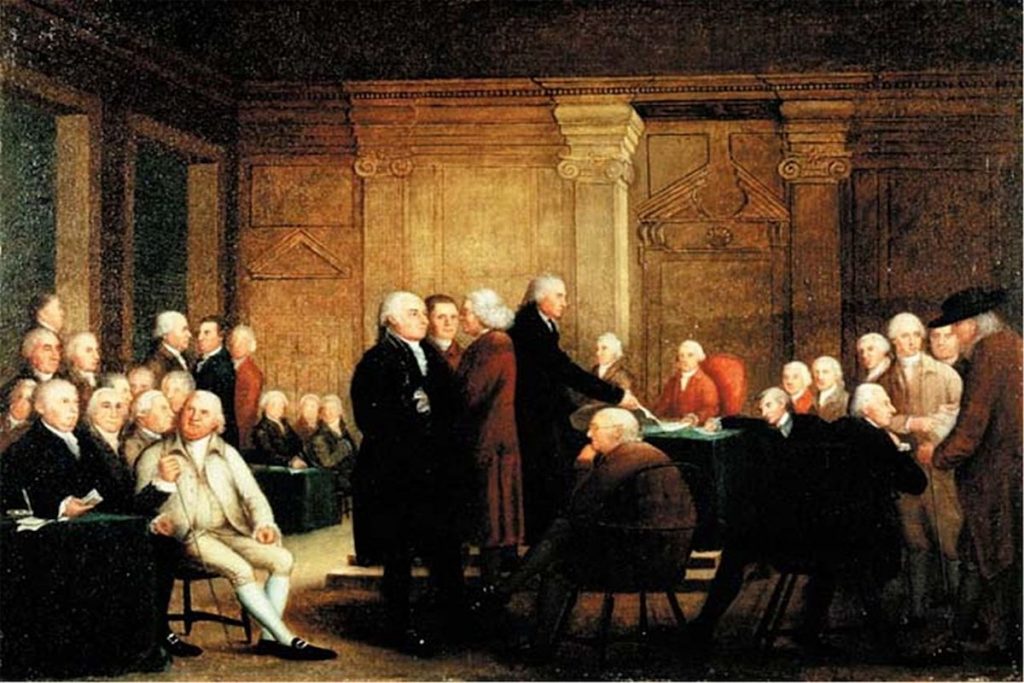This essay is part of a series on Liberalism. See the full collection here.
A flurry of commentary has appeared this summer regarding Thomas G. West’s The Political Theory of the American Founding. The book was initially reviewed at Public Discourse almost a year ago, when it was first published, but more responses have come out in the last few months.
In some ways, West’s book is even more relevant now than it was last year. The message is timely because it is the mirror image of Patrick Deneen’s popular book, Why Liberalism Failed. West even mentions in the Introduction that he initially envisioned writing a different book “defending the founders against their conservative detractors—people like political scientists Peter Lawler and Patrick Deneen, who are wary of the founders because they supposedly believed in equality and liberty too much.” While Deneen’s arguments lead one to see unreasonableness in the founders’ political, moral, and economic ideas, West’s arguments lead one to see their reasonableness.
In this essay, I gather together some important responses to West’s book, as well as his comments on those responses. It is worth taking time to thoughtfully consider these points. They will be especially instructive for conservatives looking for a way forward—which, in this case, requires us to find the correct way to look back at the founding.
Start your day with Public Discourse
Sign up and get our daily essays sent straight to your inbox.An Alternative Explanation for the Autonomy Disease
The criticism that conservatives most often level at the founders is that their classical liberalism has gradually eroded the moral foundations of our country, since classical liberals such as John Locke stressed individualism. Political individualism has led to a rejection of religious authority, an abandonment of the traditional family as the building block of society, and the moral subjectivism of today’s popular culture. The founders may not have intended any of those results, but they are the logical result of their premises, conservative critics argue. In other words, they “built worse than they knew,” so to speak. This criticism of the founders has been popular at least since Tocqueville.
Patrick Deneen, currently the best-known defender of this view, took part in a 2017 Constitution Day panel discussion at Hillsdale College where he had the opportunity to level his criticism at West. Deneen argued that the opponents of the Framers, the Anti-Federalists, offered a vision of politics more adapted to a virtuous culture—and they lost. A classical liberal view won out, and today’s laws and ideology focused on a radical autonomy of the individual is the result. West responded by saying that every country in the Western hemisphere, not just the United States, is afflicted by a kind of psychological sickness when it comes to morality. This disease is the very autonomy obsession for which Deneen blames the founders. However, America’s founding theories can’t rightly be blamed for it. How could countries not based on the American political theory contract a disease supposedly caused by it? For West, the autonomy disease has been caused by something outside political theory, in the culture.
What Deneen and so many other conservatives seek is an explanation—an explanation for the moral degradation of Western Civilization. What Tom West raises is the possibility of alternative explanations. One alternative explanation for the moral sickness of our culture could be the disillusionment caused by the wars and totalitarianism of the twentieth century. In some sense, we could have been “messed up in the head” by it all. Hence Solzhenitsyn’s essays would be a better place to look when trying to understand European nihilism than the political writings of the American founders. To understand the phenomenon in the American context, we might consider what happened to the generation of intellectuals just after the Civil War. What caused that generation to abandon the natural rights principles of Lincoln for the nihilism of the Social Darwinists and Progressives? David Goldman points out that, after the Civil War, American intellectuals such as Oliver Wendell Holmes, Jr. may have embraced pragmatism out of that same war weariness (Holmes was shot in three battles, after all). Louis Menand’s book The Metaphysical Club is a good investigation of this.
However, war-and-totalitarianism weariness is just one alternative explanation for moral breakdown. The fact that there are many possible causes other than the corrosion of classical liberalism makes Deneen’s criticism of the founders less important to our present circumstances than he imagines.
Founding Political Theory as Preventative Medicine
If it is not a disease-causing agent, how should we understand the founders’ political theory? In the recent exchange between Vincent Phillip Muñoz and West here at Public Discourse, Muñoz made the point that “a secular natural rights theory—that is, natural rights and natural law without God—is insufficient to sustain the natural rights republic.” West agreed with that sentiment, and echoed the point, writing that “reason teaches that it is unreasonable to expect people to act by reason alone.”
The point I take from Muñoz and West’s exchange is that the political theory of the founders by itself, and any political theory by itself, cannot serve as a sufficient condition for a virtuous society. That goes for natural law, natural rights, and even Aristotle’s political theories. West writes in his book that the founders would have agreed with Robert George: “Laws cannot make men moral. Only men can do that; and they can do it only by freely choosing to do the morally right thing for the right reason.” The point connects with West’s comments in the Deneen exchange: good political theories enshrined in the laws won’t necessarily save a sick culture. That is why American founders such as George Washington believed that strong religious beliefs and strong traditional families were necessary supports for life in our country to continue as they knew it. Even a good educational system that trains the minds of citizens toward intellectual virtue is not enough; West notes in his book that this is why “almost all the founders thought government has a duty to promote religion” consistent with the freedom of conscience.
The only way for Western culture to get out of its psychological sickness is to start acting according to a natural and life-affirming approach to life. As Peter Lawler once put it, “we are stuck with virtue.” This is the case even when good political theories are not enshrined in the laws (as they largely are not now).
An important question, I would argue, is whether the natural rights policies of the founders are complementary to or corrosive of virtuous living when the culture itself is virtuous. The evidence put forward by West’s book shows that the natural rights policies complement and benefit a good culture. The ideas of the American founding were well suited to a time when people still maintained that healthier approach to life, and they would still be complementary for Americans if they start acting right in their moral lives. Perhaps the elites of this country are already doing this, as Charles Murray argues, but they need to start “preaching what they practice.” Americans, to be at their best, ought to practice and preach both a moral culture and the protection of natural rights.
The political theory of the American founding is not quite the “cure for what ails us,” as Michael Anton claimed in his extensive review of West’s book, but I would argue that it can serve as a kind of preventive medicine against the psychological sickness of radical individualism. A democratic republic, when working properly, facilitates people’s living peacefully and well.
Longing for Justice, not Moral Absolutism
West argued in a recent exchange with Adam Seagrave that, as things stand today, there really is truth to the claims many citizens make about their individual rights being violated. Sadly, it is the United States government itself, through limitless bureaucracy and invasive regulations, that frequently violates Americans’ rights to freedom of conscience, speech, private property, and the basic protection of life. Our regime also enables moral license that harms American citizens, in the form of drug abuse and abortion. Peace and respect for others’ lives and property are lacking, and since at least 2016 a populist revolt has been afoot in American elections signaling the frustration.
If the limited government based on the political theory of the American founders were restored, I believe those legitimate longings for justice would be answered. The silly whining for nonsensical, made-up rights based on radical autonomy would then be recognized as such by mature adults, just as the founders would have recognized it.
West points out, following Leo Strauss, that “there is a universally valid hierarchy of ends, but there are no universally valid rules of action.” Strauss’s claim sounds similar to Alasdair MacIntyre’s rejection of attempts to justify “the Rules” through a non-teleological ethics. The founders’ political theory did not aim at enshrining conjured-up moral imperatives of the kind Kant or Rawls might imagine, but at ensuring the limited natural rights individuals actually require in order to live a flourishing life in normal circumstances.
And so, as many people have already pointed out already, the founders actually are vindicated by Thomas G. West’s new book, although that was not his explicit intention.
C.J. Wolfe will teach political science as an assistant professor at the University of St. Thomas in Houston this fall. He has previously taught at the University of Dallas, North Lake College, and Founders Classical Academy.














